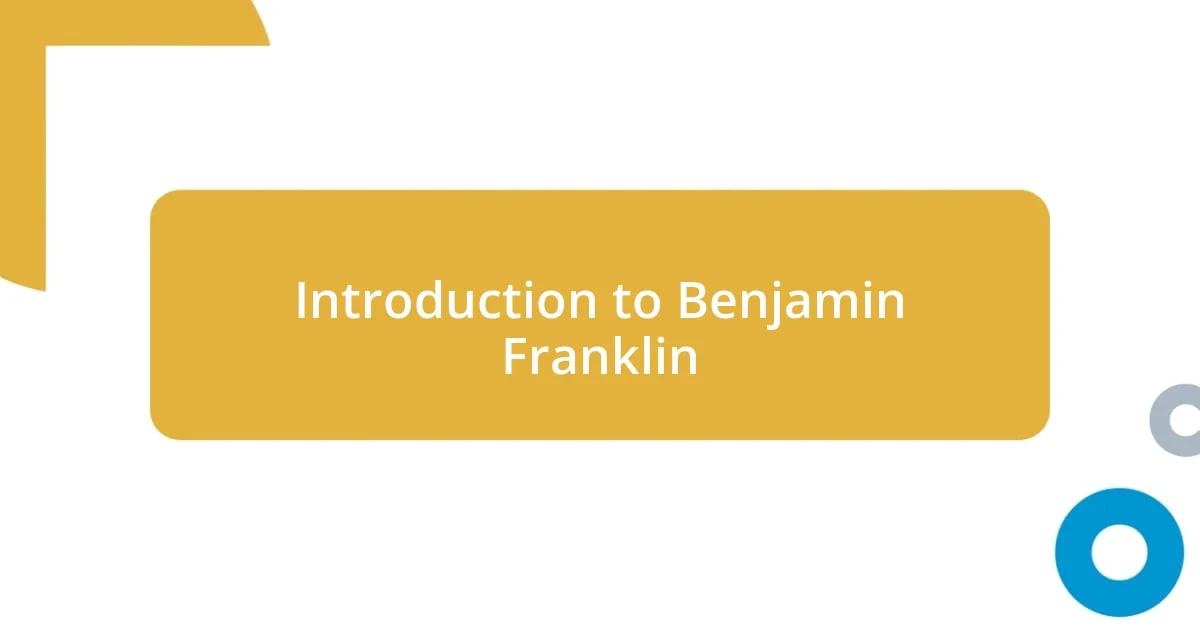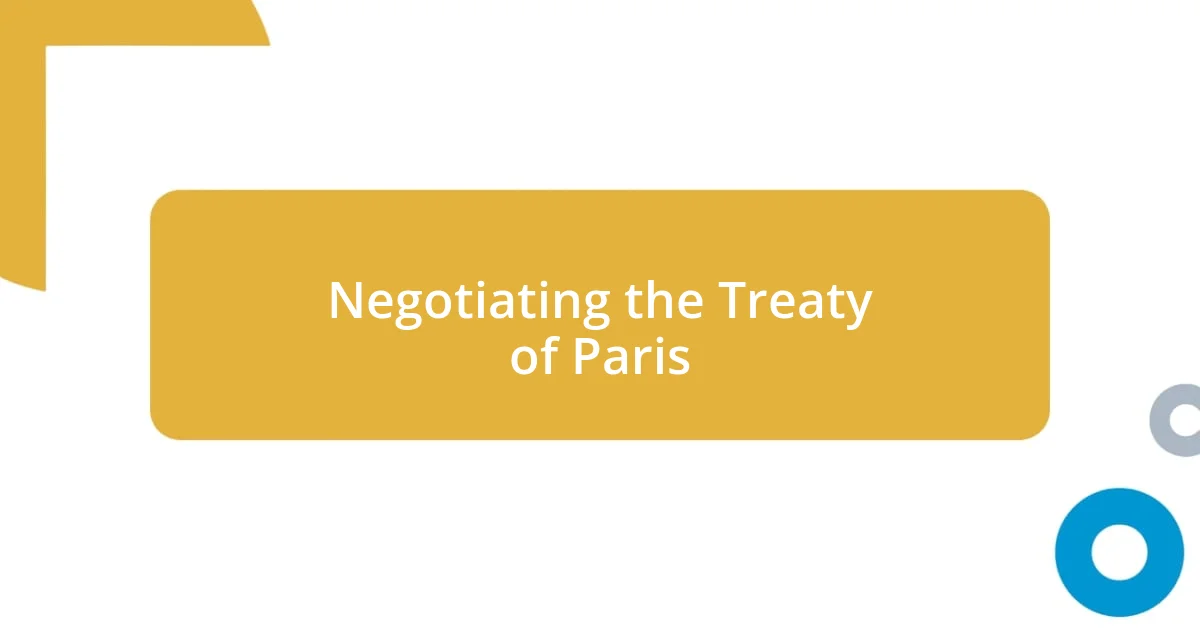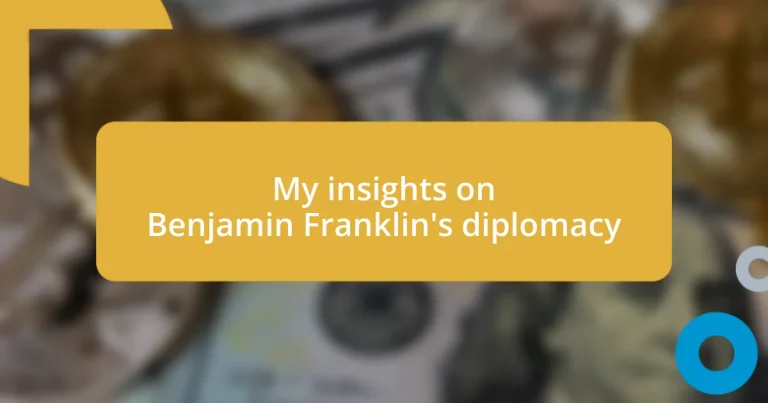Key takeaways:
- Benjamin Franklin’s early diplomatic efforts, particularly in England, helped him establish influential connections and advocate against British taxation, setting the stage for his critical role in the American Revolution.
- His appointment as U.S. Minister to France during the revolution allowed him to leverage his charm and storytelling skills to garner French support, essential for American independence.
- Franklin’s diplomatic style emphasized mutual respect, adaptability, and the power of storytelling, providing enduring lessons for modern diplomacy and relationship-building.

Introduction to Benjamin Franklin
Benjamin Franklin is often celebrated as one of the Founding Fathers of the United States, but his contributions extend beyond politics and governance. I remember first learning about him in high school, and I was struck by his multifaceted personality: he was a scientist, inventor, and, notably, a shrewd diplomat. How could one man embody so many roles, all while shaping a nation’s future? It’s fascinating to think about how his diverse interests not only enriched his life but also the lives of those around him.
His time in France as an ambassador is particularly intriguing; can you imagine the weight of the responsibility? He wasn’t just negotiating treaties; he was selling the very idea of American independence. I can almost feel the pressure he must have experienced, balancing diplomacy with the need to win hearts and minds—after all, he wasn’t just a representative of American interests but also a cultural ambassador among the French elite.
Franklin’s ability to blend charm with intellect made him a captivating figure. I often wonder how his unique approach to diplomacy—a mix of humor, curiosity, and practical wisdom—can inspire today’s leaders. His emphasis on dialogue over conflict is a lesson that remains relevant in our modern world, reminding us that effective communication may very well be the cornerstone of successful diplomacy.

Franklin’s Early Diplomatic Ventures
Benjamin Franklin’s early diplomatic ventures laid a solid foundation for his later successes. I find it remarkable that in 1757, he was sent to England as a representative for the Pennsylvania Assembly. This was not merely a trip; it was his first foray into international diplomacy. I can only imagine the mix of excitement and apprehension he must have felt, stepping into a world that was both foreign and familiar. His aim was to address colonial grievances, but he also seized the opportunity to establish himself within the British political circles.
- Negotiated with British officials: Franklin wasn’t just a passive observer; he actively engaged with influential figures.
- Built valuable connections: He fostered relationships that would later prove crucial in garnering support for the American cause.
- Advocated against taxation: I admire how he challenged British policies on taxation, using reasoned arguments that highlighted the colonists’ frustrations.
- Represented colonial interests: Even in a foreign land, Franklin’s commitment to his constituents shone through.
During these early years, Franklin honed his skills in persuasion and negotiation, setting the stage for his pivotal role in the American Revolution. I appreciate how he learned to navigate complex political landscapes, a skill that undoubtedly served him well when he later approached the French court.

Key Principles of Franklin’s Diplomacy
Franklin’s diplomacy was rooted in several key principles that defined his approach. First and foremost, he believed in the power of mutual respect and collaboration. I recall how I once tackled a group project where I realized that unity and shared vision caused our efforts to thrive. Similarly, Franklin sought to build alliances based on understanding and cooperation rather than coercion. This approach not only enhanced his credibility but also fostered long-lasting relationships.
Another critical principle was his ability to adapt and innovate in changing circumstances. Franklin was keenly aware that diplomacy wasn’t static. Once, during an event, I was asked to shift my presentation last minute due to audience interest. Embracing adaptability helped me resonate with my listeners, just as Franklin navigated the turbulent political waters of the 18th century. By understanding the changing dynamics between Britain and France, he defined his strategies accordingly, ensuring that American interests remained at the forefront.
Lastly, his knack for storytelling played a significant role in his diplomatic successes. Storytelling, as I have learned from my own experiences, captivates audiences and creates strong emotional connections. Franklin shared relatable narratives that framed the American cause in a way that appealed directly to the French populace, helping them see the logical alignment between their interests and supporting the revolution. This technique underscored the essence of effective diplomacy: it’s not just about facts and figures but about creating a compelling narrative that resonates with people’s hearts.
| Key Principle | Description |
|---|---|
| Mutual Respect | Building alliances through understanding and cooperation. |
| Adaptability | Innovating strategies based on changing political dynamics. |
| Storytelling | Connecting with others through compelling narratives. |

Franklin’s Role in American Independence
Franklin’s role in American independence was instrumental in rallying support both domestically and abroad. One of the moments that stands out to me is his appointment as the U.S. Minister to France during the revolution. It must have been a mix of pride and pressure knowing that your work could tip the scales toward freedom. Franklin understood that securing France’s support was crucial, and he leveraged his charm and wit to portray the American struggle in a light that captured their sympathy and support.
I can’t help but admire how Franklin balanced diplomacy and intrigue, especially when negotiating the Treaty of Paris. The stakes were incredibly high, and the ability to navigate through these negotiations was paramount. Reflecting on my own experiences in high-stakes situations, I can relate to that sense of urgency and resolve. Franklin not only represented American interests but ensured that the terms favored the future autonomy of the fledgling nation, signaling to the world that the colonies were not merely rebelling; they were establishing a recognized independent identity.
Additionally, Franklin’s ability to connect with people personally was a game-changer. He knew how to tell stories that resonated emotionally, and using that talent in conversations with French officials certainly helped win their favor. Have you ever been in a discussion where sharing a personal story made a dense topic suddenly feel accessible? I believe Franklin’s narratives did just that, reinforcing the idea that independence wasn’t just a political necessity; it was also a deeply human aspiration that deserved the backing of allies.

Negotiating the Treaty of Paris
Negotiating the Treaty of Paris was a delicate balancing act for Franklin. I often think about the pressures of diplomacy and how crucial it is to have a clear vision. Franklin approached these negotiations with a deep understanding that the outcomes would shape a new nation’s future. It’s fascinating to ponder how he must have felt—every word he offered carried the weight of hope for independence and the possibility of a new identity.
In those negotiations, Franklin’s ability to read the room was exceptional. I remember a time when I had to negotiate contracts and gauge the other party’s reactions closely. Just like I adapted my tone and approach based on their cues, Franklin did the same with British negotiators. His charm and shrewdness allowed him to advocate fiercely for American interests while maintaining an amicable atmosphere that kept communication lines open. Do you realize how pivotal such moments are in shaping the course of history? Franklin was right there, navigating those turbulent waters.
Moreover, the symbolism of Franklin’s presence was crucial. Picture this: he wasn’t just a diplomat from a rebellious colony; he embodied the aspirations of a people yearning for freedom. I can recall moments in my own life where I felt I had to represent more than myself—those can be heavy yet energizing burdens to carry. Franklin transformed those negotiations into a moral imperative, reminding his counterparts that recognizing the United States as an independent entity wasn’t just a political decision; it was about supporting a collective quest for liberty. How compelling is that notion that diplomacy can bring about such transformative change?

Lessons from Franklin’s Diplomatic Style
Franklin’s diplomatic style teaches us the importance of building authentic relationships. I remember attending a networking event where I spent quality time getting to know a few key individuals. Much like Franklin, who valued personal connections over formalities, I discovered that genuine conversations often lead to opportunities that go beyond mere transactions. Franklin’s ability to foster trust and camaraderie with key figures in France exemplifies how diplomacy thrives on mutual respect and understanding.
Another lesson worth noting is Franklin’s strategic use of humor and wit as tools of persuasion. I once had a difficult conversation with a colleague where I chose to lighten the mood with a small joke. That simple act transformed the tension into openness, similar to how Franklin’s charm facilitated discussions with hesitant diplomats. His casual yet impactful style illustrates that humor can bridge divides and create an environment where complex ideas can be shared more freely.
Lastly, Franklin’s adaptability throughout his diplomatic missions is remarkable. There were moments during my career when I faced unexpected changes and had to pivot quickly to keep things on track. Franklin did just that—his capacity to adjust his approach based on the dynamics of conversations helped him navigate through multifaceted negotiations. It underscores a vital truth: success in diplomacy often hinges on our willingness to remain flexible, listening intently, and responding thoughtfully to the situation at hand. Wouldn’t it be amazing if we all took a page from Franklin’s book and embraced that level of adaptability in our daily interactions?

Applying Franklin’s Strategies Today
Incorporating Franklin’s strategies into today’s diplomatic landscape requires a conscious effort to embrace his relationship-building framework. I recall a time when I had to mediate a conflict between two colleagues. Instead of diving straight into the issues, I took a step back to understand their backgrounds and motivations. This mirrors Franklin’s approach, where he invested time in relationship cultivation, proving that strong partnerships can alleviate tensions and foster collaboration.
Another vital aspect of Franklin’s diplomacy was his knack for timing and patience. I remember waiting for the right moment to bring up a sensitive topic in a project meeting. Timing is everything! Just as Franklin exercised restraint and knew when to speak or remain silent, this awareness can often lead to more productive discussions. It’s imperative to remember how being present and attentive in conversations lays the groundwork for impactful decision-making.
Lastly, I believe we shouldn’t underestimate the power of storytelling that Franklin so masterfully employed. I often share personal anecdotes to relate to others during discussions. This strategy, much like Franklin’s use of relatable tales to convey complex ideas, allows for better engagement and understanding. It prompts the question: how can we leverage our stories to connect on a deeper level? By sharing narratives, we not only humanize our interactions but also create a space where everyone feels heard. Isn’t that what every diplomatic conversation should strive to achieve?














